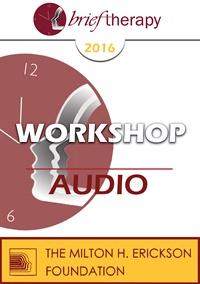
- Average Rating:
- Not yet rated
- Topic Areas:
- Meditation, Spirituality and Yoga | Workshops | Brief Therapy
- Categories:
- Brief Therapy Conference | Brief Therapy Conference 2016
- Faculty:
- Connirae Andreas, PhD
- Duration:
- 2:41:53
- Format:
- Audio Only
- Original Program Date:
- Dec 09, 2016
- Short Description:
- Eastern spiritual teachings tell us that “suffering” goes away when we dissolve the ego. But what is the ‘ego’ and how does one dissolve it? You’ll be introduced to a new and practical way of doing inner work that offers a precise way of dissolving the everyday sense of the ego. It can be used both to heal and resolve problems, and as a gentle personal practice. Typical results include *deep relaxation of the nervous system, *a greater capacity to deal with stress with grace and humor, *resolves sleep issues. The session will include group experience, demonstration, and practice of the first Wholeness Process.
- Price:
- $15.00 - Base Price
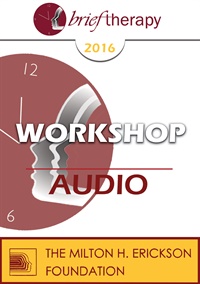
- Average Rating:
- Not yet rated
- Topic Areas:
- Workshops | Brief Therapy | Self-Image Thinking | Experiential Therapy
- Categories:
- Brief Therapy Conference | Brief Therapy Conference 2016
- Faculty:
- Stephen Lankton, MSW
- Duration:
- 2:44:03
- Format:
- Audio Only
- Original Program Date:
- Dec 09, 2016
- Short Description:
- Self-Image Thinking (SIT) is one of the cognitive—experiential interventions that every therapist will find useful for almost every client. The 'Tools of Intention' are best seen as techniques of positive-oriented psychotherapy. They can be practiced in therapy with or without hypnosis. These tools are protocols taken from an analysis of how minds already function but with an important twist: The protocols rely upon the cognitive experiential mechanisms can be used in harmony with both conscious and unconscious thoughts and feelings.
- Price:
- $15.00 - Base Price
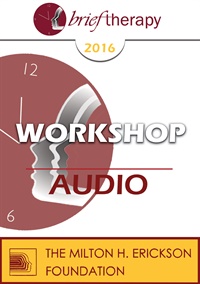
- Average Rating:
- Not yet rated
- Topic Areas:
- Anxiety | Workshops | Brief Therapy | Therapeutic Relationship
- Categories:
- Brief Therapy Conference | Brief Therapy Conference 2016
- Faculty:
- Reid Wilson, PhD
- Duration:
- 2:43:49
- Format:
- Audio Only
- Original Program Date:
- Dec 09, 2016
- Short Description:
- Therapists are supposed to make clients safe and secure, creating a cozy haven from a cruel world, right? Well, when it comes to treating anxiety, there’s growing evidence that the quickest, most effective approach involves instructing them to ramp up their fears while telling themselves how much they welcome the experience. In this workshop, you’ll learn how to help clients shift their relationship with their fears and override the responses that perpetuate them.
- Price:
- $15.00 - Base Price
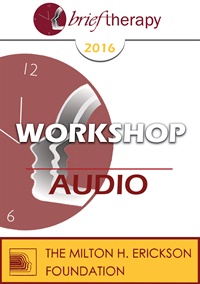
- Average Rating:
- Not yet rated
- Topic Areas:
- Workshops | Brief Therapy
- Categories:
- Brief Therapy Conference | Brief Therapy Conference 2016
- Faculty:
- Erving Polster, PhD
- Duration:
- 2:26:17
- Format:
- Audio Only
- Original Program Date:
- Dec 09, 2016
- Short Description:
- Dr. Polster will feature concentration, curiosity, fascination and simplicity of observation as agents of personhood. He will also offer four cornerstones of methodology. These are: the tightening of therapeutic sequences, establishing good quality contact, eliciting relevant stories, and identifying parts of the self. Live therapeutic sessions will illustrate the principles.
- Price:
- $15.00 - Base Price
Tags: Brief Therapy Erving Polster
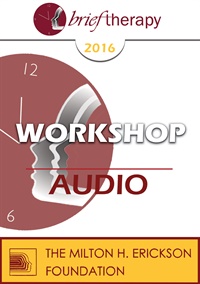
- Average Rating:
- Not yet rated
- Topic Areas:
- Psychotherapy | Workshops | Generative Psychotherapy | Addiction | Anxiety | Depression | Trauma
- Categories:
- Brief Therapy Conference | Brief Therapy Conference 2016
- Faculty:
- Stephen Gilligan, PhD
- Duration:
- 2:36:56
- Format:
- Audio Only
- Original Program Date:
- Dec 09, 2016
- Short Description:
- This workshop presents the Generative Psychotherapy approach to human states of suffering--depression, anxiety, trauma, addiction, etc. This practical and positive approach assumes that each core human experience has equivalent potential to be positive or negative, depending on the human relationship to it; and thus focuses on how problems may be transformed to resources by skillful human connection.
- Price:
- $15.00 - Base Price
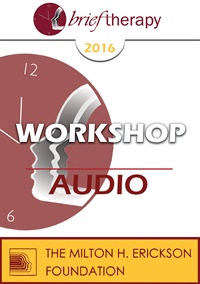
- Average Rating:
- Not yet rated
- Topic Areas:
- Workshops | Ericksonian Hypnosis and Therapy Techniques | Experiential Therapy | Relationships
- Categories:
- Brief Therapy Conference | Brief Therapy Conference 2016
- Faculty:
- Stephen Lankton, MSW
- Duration:
- 1:55:06
- Format:
- Audio Only
- Original Program Date:
- Dec 09, 2016
- Short Description:
- Milton Erickson taught that symptoms were a breakdown of relations between people. Looking at personal or family traumatic problems through this lens it is relatively easy to recognize the existence and connection between past and present disordered relationships. More importantly, the required experiential resources that individuals need to correct these conditions becomes apparent. Once identified, therapy can concentrate on helping trauma-suffering clients acquire needed experiences and help clients learn to use them systematically and appropriately.
- Price:
- $15.00 - Base Price
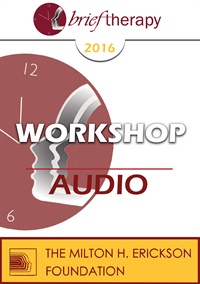
- Average Rating:
- Not yet rated
- Topic Areas:
- Meditation, Spirituality and Yoga | Workshops | Mind-Body | Ericksonian Hypnosis and Therapy Techniques | Neuroscience
- Categories:
- Brief Therapy Conference | Brief Therapy Conference 2016
- Faculty:
- Ernest Rossi, PhD | Carolyn Sauer, Psy.D.
- Duration:
- 2:32:44
- Format:
- Audio Only
- Original Program Date:
- Dec 09, 2016
- Short Description:
- How can we optimize classical yoga with Ericksonian mind-body work? This experiential workshop utilizes Ericksonian approaches with the entire audience as well as individual volunteers. Through story and movement we will access new dimensions of our emerging consciousness with the 4-stage creative psychosocial genomic cycle. Open for all fitness levels.
- Price:
- $15.00 - Base Price
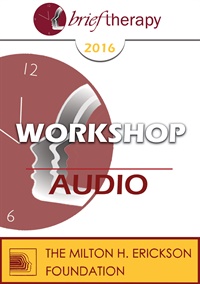
- Average Rating:
- Not yet rated
- Topic Areas:
- Psychotherapy | Workshops | Generative Psychotherapy
- Categories:
- Brief Therapy Conference | Brief Therapy Conference 2016
- Faculty:
- Stephen Gilligan, PhD
- Duration:
- 2:37:44
- Format:
- Audio Only
- Original Program Date:
- Dec 09, 2016
- Short Description:
- Generative psychotherapy is an exploration of how individuals can forge positive, therapeutic responses to life challenges. This invited address concentrates on the three core connections that allow clients to do this: (1) Positive intention and goals (What do you most want to create in your life?); (2) Somatic Centering (Where do you feel the deepest resonance in your body?); and (3) Field Resources (What can most deeply support your path of change?).
- Price:
- $15.00 - Base Price
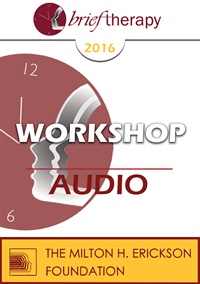
- Average Rating:
- Not yet rated
- Topic Areas:
- Workshops | Anxiety | Communication | Relationships | Therapeutic Relationship | Therapist Development
- Categories:
- Brief Therapy Conference | Brief Therapy Conference 2016
- Faculty:
- Reid Wilson, PhD
- Duration:
- 2:37:10
- Format:
- Audio Only
- Original Program Date:
- Dec 09, 2016
- Short Description:
- Taking advantage of our ever-present inner dialogue, we can help clients alter their self-talk in a way that transforms their relationship with any intimidating performance. By activating “approach” emotions and an opportunity-mindset, clients can decrease fear and improve performance. This protocol eliminates one significant step in the typical treatment process, since it is arousal congruent: clients do not need to shift their anxiety down before they step forward.
- Price:
- $15.00 - Base Price
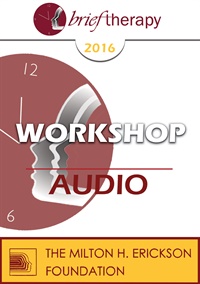
- Average Rating:
- Not yet rated
- Topic Areas:
- Workshops | Metaphors | Unconscious Processes | Brief Therapy
- Categories:
- Brief Therapy Conference | Brief Therapy Conference 2016
- Faculty:
- Connirae Andreas, PhD
- Duration:
- 2:24:50
- Format:
- Audio Only
- Original Program Date:
- Dec 11, 2016
- Short Description:
- Explore a new way to discover and work with our unconscious metaphors for our life issues, developed by Andrew T. Austin of the UK. Do you feel “stuck”? Is something “holding you back”? Is it difficult to know what direction to go? Instead of creating metaphors for our clients, we can elicit the metaphor they already have, and explore it in depth. Once this inner landscape is revealed, new directions and possibilities often become blatantly obvious. This introduction will include brief demonstration(s) and group explorations.
- Price:
- $15.00 - Base Price
Please wait ...

